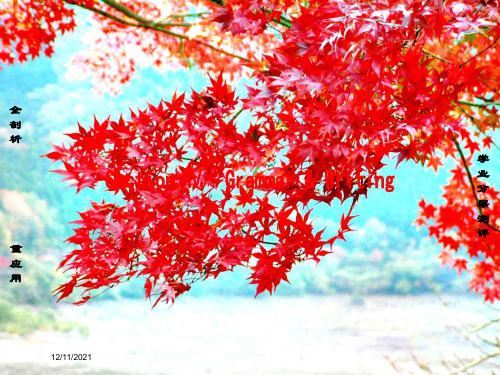Unit2TheUnitedKingdomWriting
- 格式:pptx
- 大小:1.09 MB
- 文档页数:29
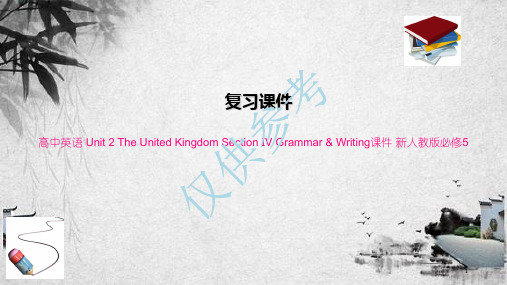
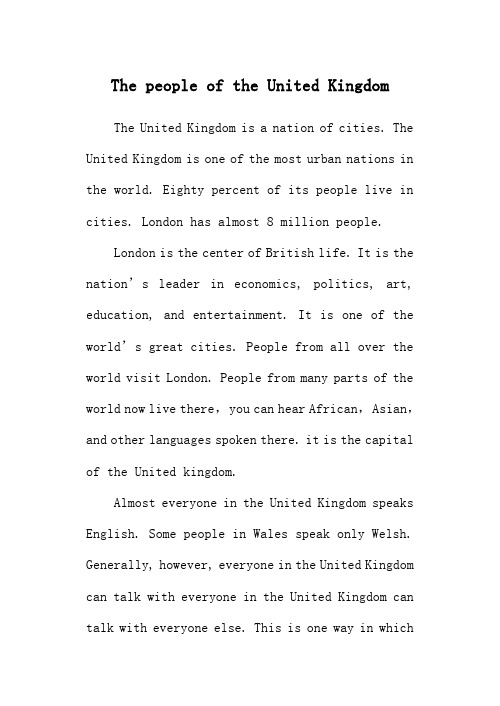
The people of the United KingdomThe United Kingdom is a nation of cities. The United Kingdom is one of the most urban nations in the world. Eighty percent of its people live in cities. London has almost 8 million people.London is the center of British life. It is the nation’s leader in economics, politics, art, education, and entertainment. It is one of the world’s great cities. People from all over the world visit London. People from many parts of the world now live there, you can hear African, Asian,and other languages spoken there. it is the capital of the United kingdom.Almost everyone in the United Kingdom speaks English. Some people in Wales speak only Welsh. Generally, however, everyone in the United Kingdom can talk with everyone in the United Kingdom can talk with everyone else. This is one way in whichthe nation is united.Another way in which the people are united is by their religion. Ninety-five percent of the British people are Protestant. The Anglican Church is the largest in England. The Presbyterian Church is the largest in Scotland. Although religion is a unifying idea for most of the nation, it divides the people in Northern Ireland.Most British citizens read and write English. This is mainly because free elementary and secondary education is given to each child in the United Kingdom. Children go to school between the ages of five and sixteen. University education, however,is limited to those who can pass strict tests.Oxford and Cambridge are two very old and respected universities in the United Kingdom. Each has been in existence for more than 600 years. There are more than forty other major universities.The British system of education has influenced the systems of education used in many other nations. Many of these nations were former colonies of Great Britain or are related to the United Kingdom today.The British people have had influence in many other parts of the world. For example, the many British ideas about society which affected the colonists of 300 years ago are still strong in the United States today. The first American universities followed the models of Oxford and Cambridge. People in this country speak, read,and write English because the United States began as thirteen British colonies.The British have also played a role in the history of many nations. At one time,Great Britain controlled a huge empire that stretched around the world. The British controlled Australia, large parts of Africa, India, Canada,and many smaller countries.Although the British Isles are a very small part of the Earth’s surface, they have produced people who have had a major role in shaping the history of the world.Over the centuries, the people of the United Kingdom have developed many traditions. Traditions are customs established by a culture over a long period of time. They are repeated in the same way for many years. They are repeated in the same way for many years. The people of the British Isles developed traditions for living,working, playing and worshiping.Many traditions developed during the Middle Ages. This was the name given to a period of time in Europe between 500 and 1 500 years ago. A way of life was established then and carried out everywhere. During this period, most people livedin villages or on Farms. There were few towns or cities. By our standards, life in these small villages changed very slowly.Most land was owned by nobles who were rich servants of the king or queen. Each noble’s land and home was called a manor. The manor was self-sufficient,producing almost everything that was needed. Food was raised in the fields. Tools were made by the blacksmith or other craft workers. Clothing was made from the wool of sheep. Except for salt and metal, the manor had little need for outside goods. There was little trade with other villages or countries. What was needed and not raised was obtained through barter. Barter is the trading of one thing for another without the use of money.The people on the manor produced many things. They raised cattle, sheep, and pigs. They plantedcrops of wheat, lye, barley, or oats. In summer,they raised cabbage and carrots. They picked fruits from the trees. They salted and dried meat and fish for winter. The village craft workers produced simple tools, carts, and clothing. The hard work of farm ing the noble’s field was done by peasants. The peasants lived on the lord’s manor for their entire lives. They were born there and they died there. Their children lived and died there as well. The peasants were part of the manor,just as the land was.。
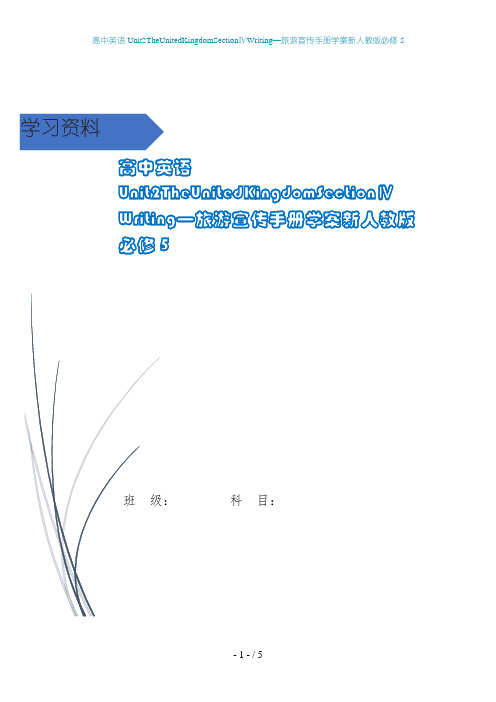
Unit 2 The United KingdomSection ⅣWriting-—旅游宣传手册旅游宣传手册是旅游行业对外宣传、吸引游客的一种重要方式。
通过景点介绍让读者对景区产生一种强烈的游览向往.一、基本结构第一部分:介绍旅游景点的基本信息,如地理位置、人文环境等。
第二部分:具体介绍其旅游特色。
第三部分:总结陈述以吸引读者前去旅游.二、增分佳句(一)介绍景点的基本信息1.It is located/lies in。
., with an area of.。
2.It covers an area of。
,with a history of.。
.3.。
.。
, located in.。
and covering an area of。
.., is one of China's most famous scenic spots.4.The history of。
.。
dates back to。
..5.It has become the most popular tourist attraction since。
.(二)介绍景点的旅游特色1.There are many places of interest, such as。
.2.You can enjoy。
,which has a high reputation both at home and abroad。
3.With.。
,。
.is/are attracting more and more tourists。
4.An interesting feature of...is..。
5.With its pleasant climate,rich natural resources and beautiful scenery, ..。
is one of China’s major tourist cities.6.A trip along..。

高中英语学习资料madeofjingetiejiUnit 2 The United Kingdom编稿:牛新阁审稿:王春霞目标认知重点词汇divide, clarify, accomplish, conflict, convenience, attract, influence, arrange, delight,小词简析重点短语consist of, refer to , credit/ to one ’ s credit,break away (from), leave out, take the place of, break down重点句型find + n./ pro. + 宾语补足语知识解说重点词汇divide【原句回放】England can be divided into three main areas.英国被分为三个主要地区。
【点拨】 divide 分开,分配常用搭配: divide ... into...把......分成......A line of trees divides the garden in half.一行树把花园分开成两半。
Divide this line into 20 equal parts. 把这条线分成20 个相等的部分。
Let’s divide ourselves into several groups.我们分成几个小组吧。
【拓展】 divide 与 separate1)divide 指把一个整体分成几部分,平时按比率划分。
2) separate 指把原来结合在一起或混杂的东西分开,东西原来没有一致性,有时含有“强行分开”之意。
Divide the money among the six of you.这笔钱你们六个人分。
We’d better separate the good ones from the bad ones. 我们最好把好的和坏的分开。
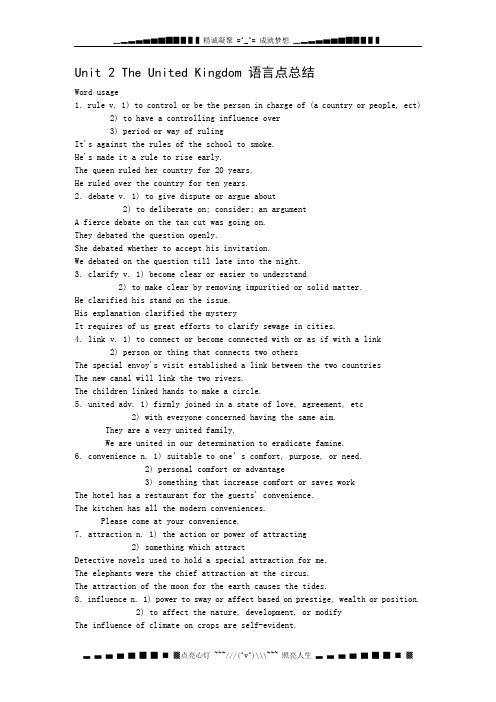
Unit 2 The United Kingdom 语言点总结Word usage1. rule v. 1) to control or be the person in charge of (a country or people, ect)2) to have a controlling influence over3) period or way of rulingIt's against the rules of the school to smoke.He's made it a rule to rise early.The queen ruled her country for 20 years.He ruled over the country for ten years.2. debate v. 1) to give dispute or argue about2) to deliberate on; consider; an argumentA fierce debate on the tax cut was going on.They debated the question openly.She debated whether to accept his invitation.We debated on the question till late into the night.3. clarify v. 1) become clear or easier to understand2) to make clear by removing impuritied or solid matter.He clarified his stand on the issue.His explanation clarified the mysteryIt requires of us great efforts to clarify sewage in cities.4. link v. 1) to connect or become connected with or as if with a link2) person or thing that connects two othersThe special envoy's visit established a link between the two countriesThe new canal will link the two rivers.The children linked hands to make a circle.5. united adv. 1) firmly joined in a state of love, agreement, etc2) with everyone concerned having the same aim.They are a very united family.We are united in our determination to eradicate famine.6. convenience n. 1) suitable to one’s comfort, purpose, or need.2) personal comfort or advantage3) something that increase comfort or saves workThe hotel has a restaurant for the guests' convenience.The kitchen has all the modern conveniences.Please come at your convenience.7. attraction n. 1) the action or power of attracting2) something which attractDetective novels used to hold a special attraction for me.The elephants were the chief attraction at the circus.The attraction of the moon for the earth causes the tides.8. influence n. 1) power to sway or affect based on prestige, wealth or position.2) to affect the nature, development, or modifyThe influence of climate on crops are self-evident.Mr. Smith is a man of influence in this town.I don't want to influence you. You must decide for yourself.9. evidence n. 1) things in forming a conclusion or judgement.2) the answers given in a court of lawHe was punished for giving false evidence.The evidence is very shaky.There are evidences that somebody has been living here.10. arrange v. 1) to plan or prepare for2) to bring about an agreement concerning; settleShe arranged the flowers in a vase.It was arranged that they should leave the following spring.Bill arranged for this man to come whenever needed.I will arrange everything.11. available adj. 1) present and ready for use; at hand ; accessible 2) capable of being gotten; obtainableThe swimming pool is available only in summerIs there water available around here?The principal is available now.This film ticket is no longer available.12. delight vt. 1) to give great pleasure or joy2) n. great pleasure or joy3) n. something that gives great pleasure or enjoyment To our delight, our football team won.She ran back home with delight.He enjoyed the delights of New York's night life.We were delighted to read your novel.She delights in her work.13. royal adj. 1) splendid, magnificent2) a member of the royal familyThe royal family consists of the king and queen and their relations We were treated to a royal feast.The boss is in royal spirits just now.The royals will go to the concert this evening.14. occasion n. 1) a special event or ceremony2) a time when something happens3) a suitable or favourable time4) to causeHe seized the occasion to invite her home for dinner.Her departure was the occasion of much sadness.You have no occasion to buy another car.His rude behavior occasioned a quarrel.15. thrill v. 1) to cause to feel a thrill or thrillsn. 2) a sudden very strong feeling of excitement, joy.He was thrilled by her conversation.She was thrilled with terror when she saw the scene of the murderShe thrilled at the invitation.Her voice thrilled with joy.Useful expressions1. refer to 1) mention or speak of sh/sb2) to pertain; concern3) to make mention or referenceDon't refer to this matter again, please.In his speech, he referred to the Bible several times.The rule refers only to special cases.Please refer to the last page of the book for answers.2. break away 1) to escape, especially with a sudden violent effort2) to end your connection with a group, organization, etThe prisoner broke away from the two policemen who were holding him. An innovation musician who broke away from the classical tradition.3. leave out 1) to fail to conclude2) fail to accept or make welcome into a social groupThey must decide what to leave out.She left out a "c" in "account" .No one speaks to him, he’s always left out.4. pick up 1) lift it up from a surface2) to gather together, collect3) to come to have, gain, learn, etcThe boy picked up the hat for the old man.You should pick up the tools after work.He was picking up the skills quickly.We picked up a couple of girls at the pub last Friday.5. break down 1) to stop working or fail2) to destroy, knock to the ground, or reduce to pieces3) to come to unsuccessful end4) to separate into different kindsThe car broke down.The police broke the door down.I try to break down her opposition to our plan.The peace talks broken down without any agreement being reached.6. devote t to give one’s time entirely to a particular activity.He devoted himself to writing.He was still devoted to the study of chemistry.He has devoted his whole life to benefiting mankind.7. lead to 1) to have as a result, cause2) to be means of sth. reaching a place, going through an area This road leads to the hotel.Smoking can lead to lung cancer.8. consist of : be made up ofWater consists of hydrogen and oxygen. The house consists of six room.。
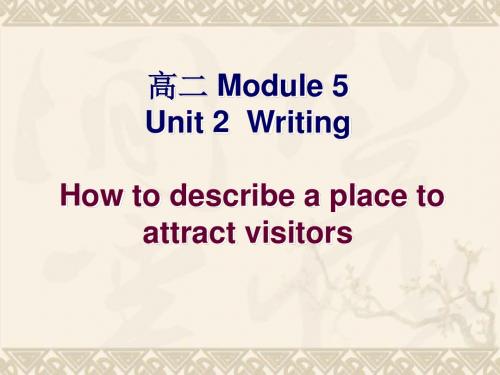
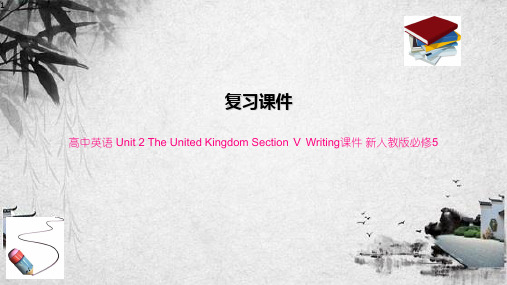
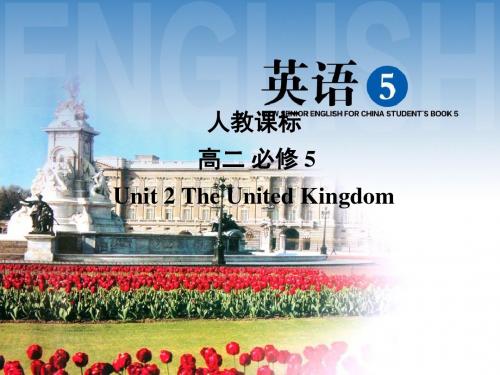

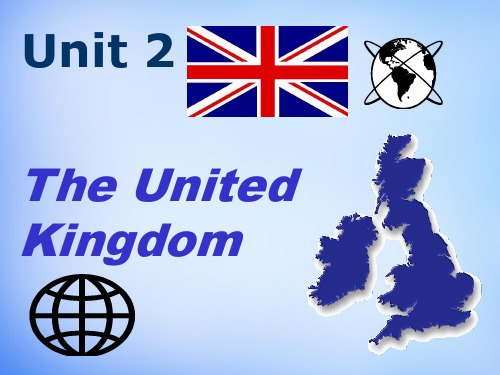
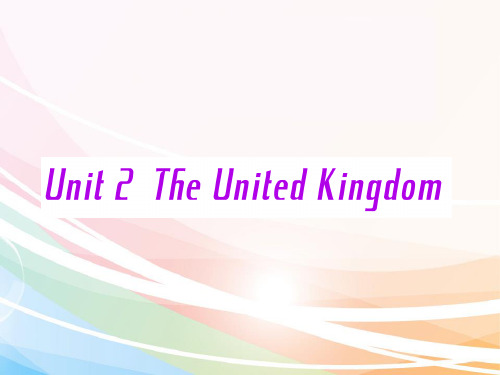
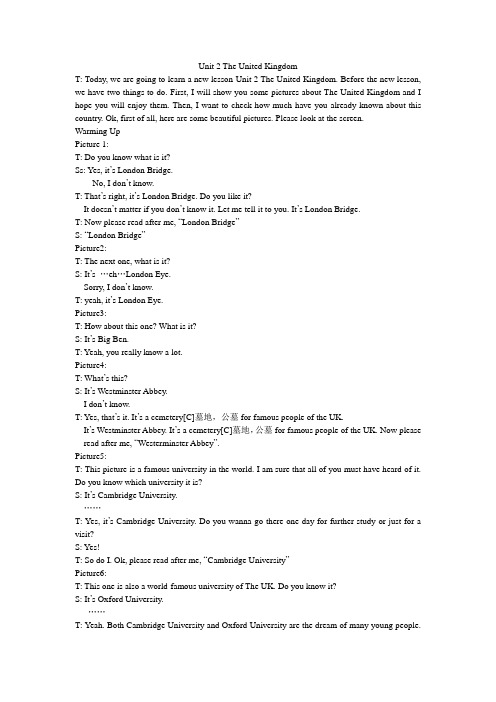
Unit 2 The United KingdomT: Today, we are going to learn a new lesson-Unit 2 The United Kingdom. Before the new lesson, we have two things to do. First, I will show you some pictures about The United Kingdom and I hope you will enjoy them. Then, I want to check how much have you already known about this country. Ok, first of all, here are some beautiful pictures. Please look at the screen.Warming UpPicture 1:T: Do you know what is it?Ss: Y es, it’s London Bridge.No, I don’t know.T: That’s right, it’s London Bridge. Do you like it?It doesn’t matter if you don’t know it. Let me tell it to you. It’s London Bridge.T: Now please read after me, “London Bridge”S: “London Bridge”Picture2:T: The next one, what is it?S: It’s …eh…London Eye.Sorry, I don’t know.T: yeah, it’s London Eye.Picture3:T: How about this one? What is it?S: It’s Big Ben.T: Yeah, you really know a lot.Picture4:T: What’s this?S: It’s Westminster Abbey.I don’t know.T: Yes, that’s it. It’s a cemetery[C]墓地,公墓for famous people of the UK.It’s Westminster Abbey. It’s a cemetery[C]墓地,公墓for famous people of the UK. Now please read after me, “Westerminster Abbey”.Picture5:T: This picture is a famous university in the world. I am sure that all of you must have heard of it. Do you know which university it is?S: It’s Cambridge University.……T: Y es, it’s Cambridge University. Do you wanna go there one day for further study or just for a visit?S: Yes!T: So do I. Ok, please read after me, “Cambridge University”Picture6:T: This one is also a world-famous university of The UK. Do you know it?S: It’s Oxford University.……T: Yeah. Both Cambridge University and Oxford University are the dream of many young people.Do you think so? Now read after me, “Oxford, Oxford University”S:……Picture7:T: Have you ever seen it on the TV or something else? What’s the name of this building?S: Yes, it’s Buckingham Palace.……T: Yeah, Buckingham Palace. Please read after me, “Buckingham Palace”.Picture8:T: What is it?S: It’s Stonehenge.……T: Yes, it’s stonehenge.Picture9:T: Do you know this person?S: Yes!T: Who is he?S: David Beckham.T: Yes, it’s David Beckham. He is English. What does he do?S: He is a world famous football player.T: Do you like him?S:Yes!T: Ok, that’s all for the pictures. Next, let’s have a quiz(测试)! Please open your books and turn to page 9. Then look at Warming Up. There are five exercises. Y ou can discuss with each other and you have 2 minutes only.(2 minutes later)Check the answers together.Pre-reading:T: First, please look at the title of the reading and have a prediction according to the title Puzzles In Geography. What do you think the passage is going to tell us from the title? Look at the screen, which ones will you choose? Education? Geography? ……OK, you have made so many choices and we’ll see whether you made them all correct later.T:Then listen to the tape and finish the two tasks:Task 1: What the main idea of this passage? What you need to do is to make a choice.Task2: Divide the passage into three parts. The main idea of each part has been given. Here are two things for you. First, how to divide the six paragraphs into three parts. Second, you have to put the main ideas into the right order. Y ou get 5 minutes in this part. Are you clear now?S: Yes!T: Ok, now please look at page 9. Let’s begin!(5 minutes later)T: Have you finished?S: Yes.No.T: Good! Let’s see the two tasks together! Exercise 1, What’s the main idea of the passage? Which one do you choose?Ok, one more minute for you. Please be quick! (One minutes later) Now, time’s up! Let see the two tasks together! Exercise 1, what is the main idea of the passage? Which one do you choose? S: D.T: let’s check! Y es, you are right! Good job!Now let’s see Exercise 2. Part 1 is from paragraph1 to paragraph…S: 3.T: Yeah, it’s from paragraph1 to paragraph3. It mainly talks about …England? London? The UK? S: The UK.T: Yes, it’s mainly talks about the UK. How about the second part? It refers to paragraph …S:4.T: Let’s check! Y es, it’s paragraph 4. What’s the topic of this part? England or London?S: England!T: Y es. Then it’s obvious that the rest of the passage belong to part 3. That is to say the part 3 includes paragraph 5 and paragraph 6. It tells us something about London. Are you clear about the structure of the whole text now?S: Yes!T: Ok, let’s repeat that together! The whole passage have three parts. Part1 is from paragraph 1 to paragraph 3. It mainly talks about The UK; Part 2 have only one paragraph. It is paragraph 4. It mainly talks about England; Part3 is from paragraph 5 to paragraph 6 and its topic is London. Clear?S: Yeah.T: Ok, wonderful! Now it’s time to go on while-reading! In this part, we’ll learn some more details about the three parts. Let’s begin with Part 1--The UK. We have known that Part 1 is from paragraph 1 to paragraph 3, right? Now, please read the three paragraphs and try to fill the form on the screen. Y ou have 3 minutes only! Now, please begin.(3 munites later)T: Time’s up. Let’s check together. The UK consists of England, Wales, Scotland and Northern Ireland. Where can we find the answers in this passage?S: Paragraph 2, line 11 and line 12.T: Ok, that’s right. Please look at line 11 and line 12. “So only Northern Ireland joined with England , Wales and Scotland to become the United Kingdom.” So it’s very easy to find out. Let’s continue. In the 13th century, Wales was linked to England. We can get the answers from line4, the second sentence. In the 17th century, England and Wales were joined to Scotland. We can know that from line 6. In the early 20th century, Southern Ireland broke away and Northern Ireland joined with England, Wales and Scotland to become the UK. We can know that from line 11 and line 12. Are you all correct?S: Yes.No.T: Ok, good! Now let’s further illustrate this on the maps. Let’s see! Before 13th century, the UK actually had one country---that is England. And the flag is Cross of St George. In the 13th century, Wales was linked to England. They still use Cross of St George as their flag. In the 17th century, England and Wales were joined to Scotland. They changed the country’s name into Great Britain. This time, the national flag combined both Cross of George and Cross of St Andrew. In the early 20th century, Northern Ireland joined to Great Britain. They changed the name into theUnited Kingdom. And they add the Northern Ireland’s flag to form a new national flag, its name is Union Jack. Please look at this one. It is called Union Jack. In one word, the UK consists of England, Wales, Scotland and Northern Ireland. Its flag is Union Jack. Do you understand now? S: Yes.T: Ok, let come to Part2--England. Please read paragraph 4 in one minutes and finish the exercises on the screen.(one minutes later)T: Time is up. Now, please look at the screen. England is divided into 3 parts. Let’s see what are they first. The below part is called the South of England. The middle part is called the Midlands. The above part is called the North of England. Clear? OK, let’s come back. Most population settled in the South of England. Most of the industrial cities are in the Midlands and the North. Many cities have famous football teams. That’s all for this part. Let’s come to part3---London. Now please read paragraph 5 and paragraph 6 and finish the three exercises on the screen. Y ou have 2 minutes only.(2 minutes later)T: Have you finished?S: Yes.T: I want to ask some students to answer these questions. Are you ready? Number 1,……Let’s check together. Is she right?S: Yes.T: Good! Give her a big hand. Number 2……let’s see. Is she correct?S: Yes.T: Yes. Good job. Now number 3……OK, that’s all for the three parts. Do you still remember what are they three parts?They are The UK, England and London. After we learn so much about the UK, I want check how well you know about it. Let’s have a contest……。

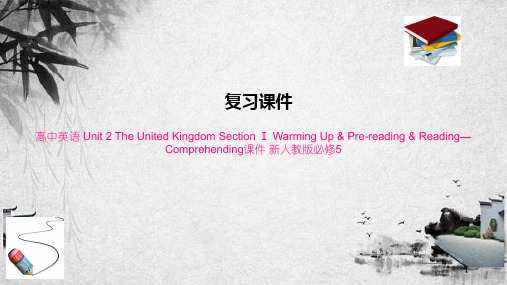

语篇专练与基础写作Ⅰ.阅读理解When my daughter and my son were in their teens,they wanted to spend most of their free time with their friends.But there were always those special times when we were reminded again how much we loved one another.Make a Date with Y our TeenI recall how delighted my 14yearold daughter,Alisa,felt whenI asked her to see a movie,Cinema Paradise,and I wanted thisstory to give her a sense of what it had felt like for me to growup as an Italian boy in a small town,where life was simple.Iwanted her to know better how her father had been broughtup.But I made it very clear that what I wanted most was aspecial date with my daughter.We both laughed and cried during the same scenes in the movie.She adored the movie.I knew she would—because I knew her.I decided we should complete our evening with some lively conversation at a nearby bakery.I told her the movie was now so much more special for me because I had shared it with her.She smiled.She understood.Seize the MomentI saw my 13yearold son,Jason,tearfully searching our vegetable garden for a place to bury his pet boa constrictor (大蟒蛇).Because my son had suffered with asthma and allergies (哮喘和过敏),he could never have the dog,the faithful friend that he wanted so much.We dug the grave,said our goodbyes and then he cried.He asked me why every pet he owned died so soon.I just held him close.We both knew something happened that day in the garden.He let me hold his aching soul.Share your heart with your teens.Show them repeatedly that you know and love who they really are.There are tender memories waiting to be made.1.The best title for the passage could be .A.Make Memories with Your TeenB.Your Children Need Your HelpC.Let Me Hold Your Painful SoulD.Be Alone with Yourself答案A解析标题归纳题。
